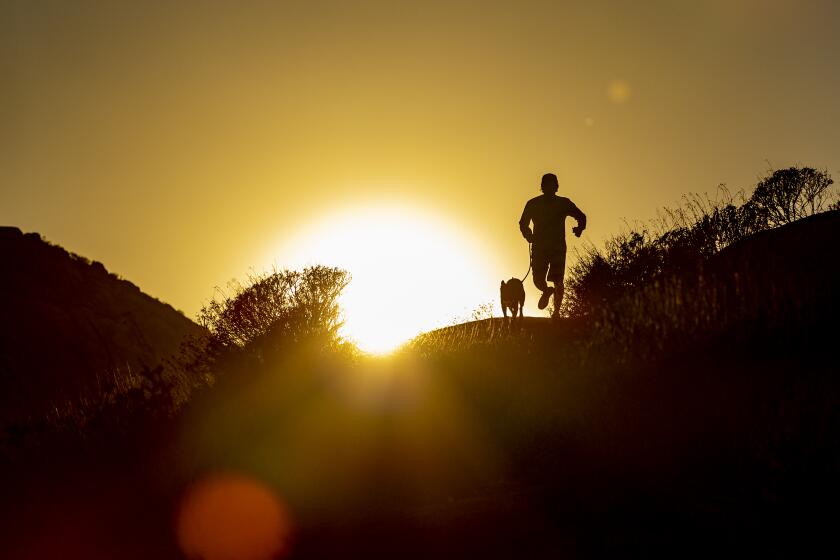Men as Mentors : Crenshaw District Office of Big Brothers Has Roles to Fill
- Share via
Walter Carpenter, a probation officer juggling a caseload of 50 troubled juveniles, would love to do more to teach those under his charge how to keep to the straight and narrow.
But he can’t. There is just not enough time in the day.
So Carpenter, who also yearns to help fatherless African American youths untouched by the juvenile justice system, decided to become a “big brother” with Big Brothers of Greater Los Angeles.
“At work, the problems hit you in the face,” he said. “It’s your job to help at work, but I had something more to give.”
The 30-year-old probation officer became one of more than a dozen black males recruited this year at Big Brothers’ new Crenshaw district office as part of an effort to find matches for nearly 100 black youths on the organization’s waiting list.
“Suddenly there is interest and matches have gone up where there were none,” said Sybil Harris, Big Brothers’ community outreach coordinator.
Big Brothers opened the office in the largely African American community not long after last year’s “Million Man March” triggered a spirit of voluntarism in black communities nationwide.
“I had a desire to give something back,” said Carpenter, who is black. “I consider myself very fortunate. I was raised by a caring father and mother. I want to do something to help those who haven’t been as lucky.”
After submitting to an interview and a background check that included finger-printing, Carpenter was approved and teamed with Tramell Vinscon, an energetic 12-year-old who was not too keen on school.
They had one thing in common: the love of basketball. Tramell, whose mother worked full time, was nurtured on the playgrounds. Carpenter, who attended college on a basketball scholarship, still played pickup games and had even developed a fledgling clothing line with a basketball hoop logo, “Spot Up.”
“Tramell doesn’t have a lot of negatives in his life,” Carpenter said. “He is charming and takes criticism well.”
Once a week, the two meet, going to the playground to shoot hoops, or to a fast-food restaurant to eat.
“He always steals my French fries,” said Tramell, adding that his friend of six months has helped him control his temper.
Valerie Parker, Tramell’s mother, has seen the changes in her son.
“Before they met, he had a ‘don’t care’ attitude,” she said. “Now he is trying harder at school and getting along better with people.”
Even his grades have improved.
“The first time I saw his report card, he had 12 U’s--all unsatisfactories,” Carpenter recalled. “I said: ‘Wow, I think you can do better than that.”
He did, going from 12 unsatisfactories to two in one grading period.
“Now that’s a great start,” Carpenter said. “He is really making an effort.”
Big Brothers’ Sybil Harris points to Tramell as an example of how the program can work. But for every Tramell, there are eight children who are unable to find matches because there is a shortage of volunteers, particularly for black and Latino youths in South and South-Central Los Angeles.
The move to Crenshaw has increased the number of men signing up but it has also boosted the number of children on the waiting list. To keep those on the waiting list from becoming disenchanted, the organization set up a sports mentoring program designed to sponsor daylong events that don’t require long-term commitments.
“We felt we had to do something to give the kids hope and let them know that Big Brothers has not forgotten them,” said Mark Scoggins, a Big Brothers board member and a marketing executive for the Los Angeles Lakers. The children are taken to basketball games, carnivals and other outings.
Last month, the owner of a Melrose Avenue barber shop, Lovell and Co., offered free haircuts for any child in the program or on the waiting list. Nearly 300 showed up.
Those who arrived first were given any hairstyle of their choice. “If they wanted the word Nike cut in their hair, we did it, a lightning bolt, or their names or their favorite teams. Whatever they wanted,” said owner Woody Lovell.
By the end of the day, he had to abandon the more time-consuming stylized cuts.
Lovell, who is also a Big Brother, said he agreed to do the haircuts because he wanted the boys to feel that someone cared.
“We have a responsibility when it comes to our youth,” he said. “My father was never really around for me. I didn’t get to know him until I turned 18, and then we met up and became best of friends.”
Diane Pritchett can’t wait that long. Charles Williams, her 9-year-old son, is on the waiting list.
Pritchett, a cashier, says she tries her best, but there are some things she can’t do. For example, she cannot take off time from work to take her son to soccer or baseball practice.
“He is a good boy,” she said. “But he really needs a man around. Not a father figure but a man figure. I just don’t want him to get into trouble.”
There is too little time, she said, and what is left is running out.
*
The Beat
Today’s centerpiece focuses on the Big Brothers of Greater Los Angeles and its Crenshaw district branch, which teams male adults with boys ages 6 to 12, providing the youngsters with companionship and role models. For information, call the Crenshaw office at (213) 294-2200 or the main Big Brothers office at (213) 258-3333.
More to Read
Sign up for Essential California
The most important California stories and recommendations in your inbox every morning.
You may occasionally receive promotional content from the Los Angeles Times.













